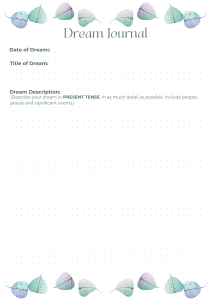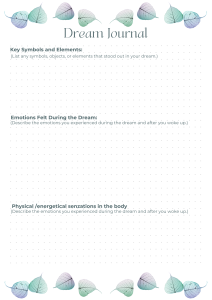Discover the Power of Your Dreams: Try Our Detailed Dream Workshop Template
Why Focus on Dreams?
Dreams are more than just random images and stories our minds create while we sleep. They can reveal our deepest fears, desires, and unresolved issues. By exploring our dreams, we can gain valuable insights into ourselves, our emotional well-being, and our life journeys.
The Dream Workshop Template



!!! DOWNLOAD HERE The Dream Template
Our Dream Workshop Template is comprehensive and designed to help you get the most out of your dreams. Here’s what it includes:
1. Dream Journal Template
- Date of Dream: Note the date so you can track patterns over time. This helps you see if certain dreams repeat or occur during specific times in your life.
- Title of Dream: Give your dream a title that captures its essence. This can help you quickly recall the dream’s main theme later.
- Dream Description: Write down everything you remember about your dream in as much detail as possible. Include people, places, emotions, and significant events. The more detailed, the better.
- Key Symbols and Elements: List any symbols, objects, or elements that stood out to you in the dream. Symbols can hold significant meanings and reveal deeper insights.
- Emotions Felt During the Dream: Reflect on the emotions you experienced during the dream. Were you scared, happy, confused? Emotions can provide clues about the dream’s meaning.
- Possible Meanings and Associations: Think about what the dream might mean to you. Consider personal associations, current life situations, and any intuitive insights. How does the dream relate to your waking life?
- Action Steps or Reflections: Consider any actions you might take or further reflections based on the dream. This could include journaling further, discussing it with someone, or meditating on its meaning.
2. Workshop Discussion Points
- Dream Sharing: Participants share their dreams using the template, fostering a supportive and respectful group environment. Sharing helps you see your dream from different perspectives and gain new insights.
- Symbol Analysis: Identify common symbols and themes within the dreams shared. Discuss the personal and collective meanings of these symbols. This can help uncover hidden messages in your dreams.
- Emotional Insights: Explore the emotions felt during the dreams and their connections to waking life. Discuss how these emotions might offer insights into current challenges or opportunities.
- Reflective Questions: Delve into questions that reveal deeper insights into your inner world. For example: What does this dream reveal about your inner world? How might this dream be guiding you in your waking life?
- Integrative Practices: Practices such as dream journaling, meditation, or creative expression are a great support to integrate dream insights into daily life. People can set intentions for future dreams and reflections.
- Group Discussion: This creates a collaborative learning environment where everyone benefits.
3. Types of Dreams
Understanding the types of dreams can help you recognize which dreams are more common for you and what they might signify:
- Lucid Dreams: In these dreams, you are aware that you are dreaming and can often control the dream’s outcome. Lucid dreams can be a powerful tool for exploring your subconscious and practicing new skills.
- Recurring Dreams: These are dreams that repeat themselves with little variation in story or theme. They often indicate unresolved issues in your life.
- Nightmares: Disturbing dreams that cause you to wake up feeling anxious or scared. They can be a way for your mind to process stress, fear, or trauma.
- Healing Dreams: These dreams may offer solutions to problems or provide a sense of peace and resolution. They can be very comforting and insightful.
- Prophetic Dreams: Dreams that seem to predict future events. While controversial, some people believe these dreams offer glimpses of what is to come.
- Daydreams: Though not technically dreams, these semi-conscious reveries can provide insights into your desires and goals.
4. How to Use the Template
Whether you’re new to dream analysis or have been exploring your dreams for years, our Dream Workshop Template is a helpful tool. Here’s how you can use it:
- Keep a Dream Journal: Write down your dreams as soon as you wake up. The details can fade quickly, so it’s best to jot them down right away. Keeping a consistent record helps you track patterns and themes.
- Reflect on Your Dreams: Take time to think about what your dreams might be telling you. Use the template to guide your reflections. Pay attention to recurring symbols and emotions.
- Share and Discuss: If you’re comfortable, share your dreams with a trusted friend or join a dream workshop. Discussing your dreams can provide new insights and perspectives. Hearing how others interpret your dream can be eye-opening.
- Practice Regularly: The more you pay attention to your dreams, the more you’ll learn from them. Make it a habit to reflect on your dreams regularly. Over time, you may notice patterns and gain deeper insights into your subconscious mind.
Conclusion
Exploring your dreams can be a fun and insightful way to understand yourself better. Our Dream Workshop Template is here to help you dive deep into your dream world and uncover the wisdom within. Give it a try and see what your dreams are telling you!
Happy dreaming! 🌙
